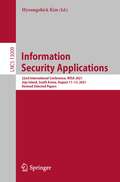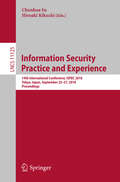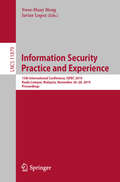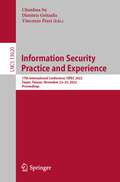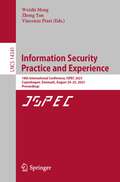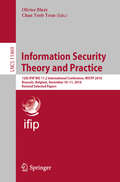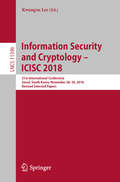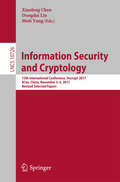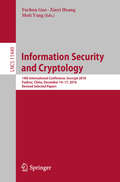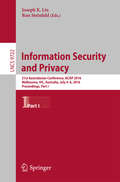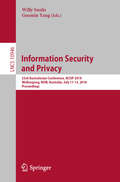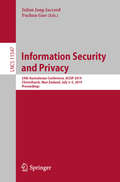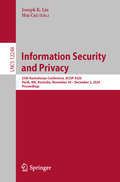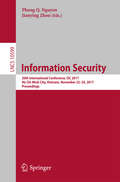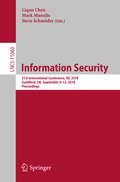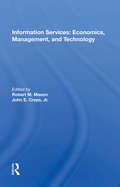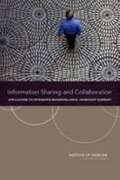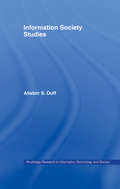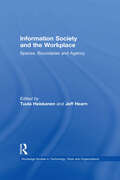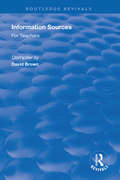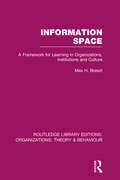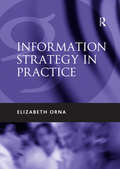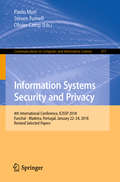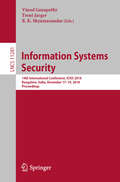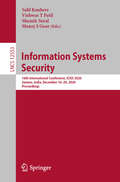- Table View
- List View
Information Security Applications: 22nd International Conference, WISA 2021, Jeju Island, South Korea, August 11–13, 2021, Revised Selected Papers (Lecture Notes in Computer Science #13009)
by Hyoungshick KimThis book constitutes the revised selected papers from the 22nd International Conference on Information Security Applications, WISA 2021, which took place on Jeju Island, South Korea, during August 2021. The 23 papers included in this book were carefully reviewed and selected from 66 submissions. They were organized in topical sections as follows: machine learning security; cryptography; hardware security; and application security.
Information Security Practice and Experience: 14th International Conference, ISPEC 2018, Tokyo, Japan, September 25-27, 2018, Proceedings (Lecture Notes in Computer Science #11125)
by Chunhua Su Hiroaki KikuchiThis book constitutes the refereed proceedings of the 14th International Conference on Information Security Practice and Experience, ISPEC 2018, held in Tokyo, Japan, in September 2018. The 39 papers presented in this volume were carefully reviewed and selected from 73 submissions. They were organized in topical sections named: system security; public key cryptography; searchable and functional encryption; post-quantum signature schemas; security protocols; network security; authentication; side-channel attacks; security for cyber-physical systems; security in mobile environment; secure computation and data privacy; and cryptographic protocols.
Information Security Practice and Experience: 15th International Conference, ISPEC 2019, Kuala Lumpur, Malaysia, November 26–28, 2019, Proceedings (Lecture Notes in Computer Science #11879)
by Javier Lopez Swee-Huay HengThis book constitutes the refereed proceedings of the 15th International Conference on Information Security Practice and Experience, ISPEC 2019, held in Kuala Lumpur, Malaysia, in November 2019. The 21 full and 7 short papers presented in this volume were carefully reviewed and selected from 68 submissions. They were organized into the following topical sections: Cryptography I, System and Network Security, Security Protocol and Tool, Access Control and Authentication, Cryptography II, Data and User Privacy, Short Paper I, and Short Paper II.
Information Security Practice and Experience: 17th International Conference, ISPEC 2022, Taipei, Taiwan, November 23–25, 2022, Proceedings (Lecture Notes in Computer Science #13620)
by Vincenzo Piuri Chunhua Su Dimitris GritzalisThis book constitutes the refereed proceedings of the 17th International Conference on Information Security Practice and Experience, ISPEC 2022, held in Taipei, Taiwan, in November 2022. The 33 full papers together with 2 invited papers included in this volume were carefully reviewed and selected from 87 submissions. The main goal of the conference is to promote research on new information security technologies, including their applications and their integration with IT systems in various vertical sectors.
Information Security Practice and Experience: 18th International Conference, ISPEC 2023, Copenhagen, Denmark, August 24–25, 2023, Proceedings (Lecture Notes in Computer Science #14341)
by Vincenzo Piuri Zheng Yan Weizhi MengThis book constitutes the refereed proceedings of the 18th International Conference on Information Security Practice and Experience, ISPEC 2023, held in Copenhagen, Denmark, in August 2023.The 27 full papers and 8 short papers included in this volume were carefully reviewed and selected from 80 submissions. The main goal of the conference is to promote research on new information security technologies, including their applications and their integration with IT systems in various vertical sectors.
Information Security Theory and Practice: 12th IFIP WG 11.2 International Conference, WISTP 2018, Brussels, Belgium, December 10–11, 2018, Revised Selected Papers (Lecture Notes in Computer Science #11469)
by Olivier Blazy Chan Yeob YeunThis volume constitutes the refereed proceedings of the 12th IFIP WG 11.2 International Conference on Information Security Theory and Practices, WISTP 2018, held in Brussels, Belgium, in December 2018. The 13 revised full papers and 2 short papers presented were carefully reviewed and selected from 45 submissions. The papers are organized in the following topical sections: real world; cryptography; artificial learning; cybersecurity; and Internet of things.
Information Security and Cryptology – ICISC 2018: 21st International Conference, Seoul, South Korea, November 28–30, 2018, Revised Selected Papers (Lecture Notes in Computer Science #11396)
by Kwangsu LeeThis book constitutes revised selected papers from the 21st International Conference on Information Security and Cryptology, ICISC 2018, held in Seoul, South Korea, in November 2018. The total of 21 papers presented in this volume were carefully reviewed and selected from 49 submissions. The papers were organized in topical sections named: public-key encryption and implementation; homomorphic encryption; secure multiparty computation; post-quantum cryptography; secret sharing and searchable encryption; storage security and information retrieval; and attacks and software security.
Information Security and Cryptology: 13th International Conference, Inscrypt 2017, Xi'an, China, November 3–5, 2017, Revised Selected Papers (Lecture Notes in Computer Science #10726)
by Moti Yung Dongdai Lin Xiaofeng ChenThis book constitutes the thoroughly refereed post-conference proceedings of the 13th International Conference on Information Security and Cryptology, Inscrypt 2017, held in Xi'an, China, in November 2017.The 27 revised full papers presented together with 5 keynote speeches were carefully reviewed and selected from 80 submissions. The papers are organized in the following topical sections: cryptographic protocols and algorithms; digital signatures; encryption; cryptanalysis and attack; and applications.
Information Security and Cryptology: 14th International Conference, Inscrypt 2018, Fuzhou, China, December 14-17, 2018, Revised Selected Papers (Lecture Notes in Computer Science #11449)
by Moti Yung Xinyi Huang Fuchun GuoThis book constitutes the post-conference proceedings of the 14th International Conference on Information Security and Cryptology, Inscrypt 2018, held in Fuzhou, China, in December 2018.The 31 full papers presented together with 5 short papers and 1 invited paper were carefully reviewed and selected from 93 submissions. The papers cover topics in the field of blockchain and crypto currency; lattice-based cryptology; symmetric cryptology; applied cryptography; information security; assymetric encryption; and foundations.
Information Security and Privacy: 21st Australasian Conference, ACISP 2016, Melbourne, VIC, Australia, July 4-6, 2016, Proceedings, Part I (Lecture Notes in Computer Science #9722)
by Joseph K. Liu Ron SteinfeldThe two-volume set LNCS 9722 and LNCS 9723 constitutes the refereed proceedings of the 21st Australasian Conference on Information Security and Privacy, ACISP 2016, held in Melbourne, VIC, Australia, in July 2016. The 52 revised full and 8 short papers presented together with 6 invited papers in this double volume were carefully revised and selected from 176 submissions. The papers of Part I (LNCS 9722) are organized in topical sections on National Security Infrastructure; Social Network Security; Bitcoin Security; Statistical Privacy; Network Security; Smart City Security; Digital Forensics; Lightweight Security; Secure Batch Processing; Pseudo Random/One-Way Function; Cloud Storage Security; Password/QR Code Security; and Functional Encryption and Attribute-Based Cryptosystem. Part II (LNCS 9723) comprises topics such as Signature and Key Management; Public Key and Identity-Based Encryption; Searchable Encryption; Broadcast Encryption; Mathematical Primitives; Symmetric Cipher; Public Key and Identity-Based Encryption; Biometric Security; Digital Forensics; National Security Infrastructure; Mobile Security; Network Security; and Pseudo Random/One-Way Function.
Information Security and Privacy: 23rd Australasian Conference, ACISP 2018, Wollongong, NSW, Australia, July 11-13, 2018, Proceedings (Lecture Notes in Computer Science #10946)
by Willy Susilo Guomin YangThis book constitutes the refereed proceedings of the 23rd Australasian Conference on Information Security and Privacy, ACISP 2018, held in Wollongong, Australia, in July 2018. The 41 revised full papers and 10 short papers presented were carefully revised and selected from 136 submissions. The papers present theories, techniques, implementations, applications and practical experiences on a variety of topics such as foundations, symmetric-key cryptography, public-key cryptography, cloud security, post-quantum cryptography, security protocol, system and network security, and blockchain and cryptocurrency.
Information Security and Privacy: 24th Australasian Conference, ACISP 2019, Christchurch, New Zealand, July 3–5, 2019, Proceedings (Lecture Notes in Computer Science #11547)
by Fuchun Guo Julian Jang-JaccardThis book constitutes the refereed proceedings of the 24th Australasian Conference on Information Security and Privacy, ACISP 2019, held in Christchurch, New Zealand, in July 2019. The 32 revised full papers and 8 short papers presented were carefully revised and selected from 129 submissions. The papers present and discuss the latest research, trends, breakthroughs, and challenges in the domain of information security, privacy and cybersecurity on a variety of topics such as encryption; post-quantum security; cryptocurrency related; foundations; system and network security; and symmetric cryptography.
Information Security and Privacy: 25th Australasian Conference, ACISP 2020, Perth, WA, Australia, November 30 – December 2, 2020, Proceedings (Lecture Notes in Computer Science #12248)
by Joseph K. Liu Hui CuiThis book constitutes the refereed proceedings of the 25th Australasian Conference on Information Security and Privacy, ACISP 2020, held in Perth, WA, Australia, in November 2020*. The 31 revised full papers and 5 short papers presented were carefully revised and selected from 151 submissions. The papers present and discuss the latest research, trends, breakthroughs, and challenges in the domain of information security, privacy and cybersecurity on a variety of topics such as post-quantum cryptography; symmetric cipher; signature; network security and blockchain; cryptographic primitives; mathematical foundation; machine learning security, among others. *The conference was held virtually due to COVID-19 pandemic.
Information Security: 20th International Conference, ISC 2017, Ho Chi Minh City, Vietnam, November 22-24, 2017, Proceedings (Lecture Notes in Computer Science #10599)
by Phong Q. Nguyen and Jianying ZhouThis book constitutes the refereed proceedings of the 20th International Conference on Information Security, ISC 2017, held in Ho Chi Minh City, Vietnam, in November 2017. The 25 revised full papers presented were carefully reviewed and selected from 97 submissions. The papers are organized in topical sections on symmetric cryptography, post-quantum cryptography, public-key cryptography, authentication, attacks, privacy, mobile security, software security, and network and system security.
Information Security: 21st International Conference, ISC 2018, Guildford, UK, September 9–12, 2018, Proceedings (Lecture Notes in Computer Science #11060)
by Liqun Chen Mark Manulis Steve SchneiderThis book constitutes the proceedings of the 21st International Conference on Information Security, ISC 2018, held in Guildford, UK, in September 2018. The 26 full papers presented in this volume were carefully reviewed and selected from 59 submissions. The book also includes one invited talk in full-paper length. The papers were organized in topical sections named: software security; symmetric ciphers and cryptanalysis; data privacy and anonymization; outsourcing and assisted computing; advanced encryption; privacy-preserving applications; advanced signatures; and network security.
Information Services: Economics, Management, And Technology
by Robert M. Mason John E. CrepsAs information service management becomes increasingly critical in the 1980s, its attention is no longer limited to the acquisition, indexing, and storage of documents. Instead, it is taking on an expanded role in the understanding and analysis of economic issues and the management of technological innovation, This collection defines the dimensions of this expanded role and suggests strategies for improved information service management. Three principal areas related to information policy and decision making are covered: economics and government policy, management and marketing of services, and innovations and the impacts of technology. The book provides a practical and comprehensive background and framework for librarians, students of information science, information center managers, and others who are concerned with effective management of information services.
Information Sharing and Collaboration: Workshop Summary
by Deepali M. PatelAfter the September 11, 2001, terrorist attacks and subsequent anthrax mailings, the U. S. government prioritized a biosurveillance strategy aimed at detecting, monitoring, and characterizing national security health threats in human and animal populations, food, water, agriculture, and the environment. However, gaps and challenges in biosurveillance efforts and integration of biosurveillance activities remain. September 8-9, 2011, the IOM held a workshop to explore the information-sharing and collaboration processes needed for the nation's integrated biosurveillance strategy.
Information Society Studies (Routledge Research in Information Technology and Society #3)
by Alistair S. DuffWe are often told that we are "living in an information society" or that we are "information workers." But what exactly do these claims mean, and how might they be verified? In this important methodological study, Alistair S. Duff cuts through the rhetoric to get to the bottom of the "information society thesis." Wide-ranging in coverage, this study will be of interest to scholars in information science, communication and media studies and social theory. It is a key text for the newly-unified specialism of information society studies, and an indispensable guide to the future of this discipline.
Information Society and the Workplace: Spaces, Boundaries and Agency (Routledge Studies in Technology, Work and Organizations #Vol. 1)
by Jeff Hearn Tuula HeiskanenMuch has been written on the grand prospects for "Information Society"; much less on what this might mean in everyday terms. So what do we find when we look at what is happening in a society, Finland, that is one of closest to an information society? Bringing together studies of everyday local practices in workplaces within information society, this book has a special focus on social space and the agency of actors. It includes both theoretical reviews and detailed qualitative research. It also highlights the political challenges of the information society, challenges which are likely to become subjects of international concern.
Information Sources for Teachers (Routledge Revivals)
by David BrownPublished in 1996, this book aims to address the problem faced by teachers needing basic information about the subject they have been asked to teach. It includes addresses of publishers, suppliers, agencies and organizations which should be useful for teachers.
Information Space: A Framework For Learning In Organizations, Institutions, And Culture (Routledge Library Editions: Organizations)
by Max BoisotIn this book the author lays the foundations for a new political economy of information. The information space, or I-Space is the conceptual framework in which organizations, institutions and cultures are being transformed by new information and communication technologies. In the penultimate chapter, the I-Space’s usefulness as an explanatory framework is illustrated with an application: a case study of China’s modernization. Information Space proposes a radical shift in the way that we approach the emerging information age and the implications it holds for societies, organizations and individuals.
Information Strategy in Practice
by Elizabeth OrnaLiz Orna's original Practical Information Policies has become a standard text which has helped information managers in many countries to take productive action in their own environment: to get a job they wanted, carry through an information audit, make a successful business case for an information policy, or formulate an information strategy. This book is designed specially for students preparing to enter the information professions; working professionals in other fields, whose job includes an information-management element; and senior managers from other specialisms who have overall responsibilities for information activities. Information Strategy in Practice provides, in brief and practical form, and informal style: ¢ a reliable account of the key processes involved in developing organizational information policy and strategy, with realistic suggestions on carrying them through, drawn from actual practice ¢ a sound framework of the ideas underlying the practice recommended, which readers can relate to their own context ¢ advice from experience about dealing with the kind of problems that often beset information-strategy development, and about getting the best from the process.
Information Systems Security and Privacy: 4th International Conference, ICISSP 2018, Funchal - Madeira, Portugal, January 22-24, 2018, Revised Selected Papers (Communications in Computer and Information Science #977)
by Steven Furnell Olivier Camp Paolo MoriThis book constitutes the revised selected papers of the Third International Conference on Information Systems Security and Privacy, ICISSP 2018, held in Funchal - Madeira, Portugal, in January 2018.The 15 full papers presented were carefully reviewed and selected from a total of 71 submissions. They are dealing with topics such as data and software security; privacy and confidentiality; mobile systems security; biometric authentication; information systems security and privacy; authentication, privacy and security models; data mining and knowledge discovery; phishing; security architecture and design analysis; security testing; vulnerability analysis and countermeasures; web applications and services.
Information Systems Security: 14th International Conference, ICISS 2018, Bangalore, India, December 17-19, 2018, Proceedings (Lecture Notes in Computer Science #11281)
by Trent Jaeger Vinod Ganapathy R. K. ShyamasundarThis book constitutes the refereed proceedings of the 14th International Conference on Information Systems Security, ICISS 2018, held in Bangalore, India, in December 2018.The 23 revised full papers presented in this book together with 1 invited paper and 3 keynote abstracts were carefully reviewed and selected from 51 submissions. The papers are organized in the following topical sections: security for ubiquitous computing; modelling and anaylsis of attacks; smartphone security; cryptography and theory; enterprise and cloud security; machine learning and security; privacy; and client security and authentication.
Information Systems Security: 16th International Conference, ICISS 2020, Jammu, India, December 16–20, 2020, Proceedings (Lecture Notes in Computer Science #12553)
by Salil Kanhere Vishwas T Patil Shamik Sural Manoj S GaurThis book constitutes the proceedings of the 16th International Conference on Information Systems Security, ICISS 2020, held in Jammu, India, during December 16-20, 2020.The 11 regular papers, 2 short papers and 3 work-in-progress papers included in this volume were carefully reviewed and selected from a total of 53 submissions. The papers were organized in topical sections named: access control; AI/ML in security; privacy and Web security; cryptography; and systems security.
